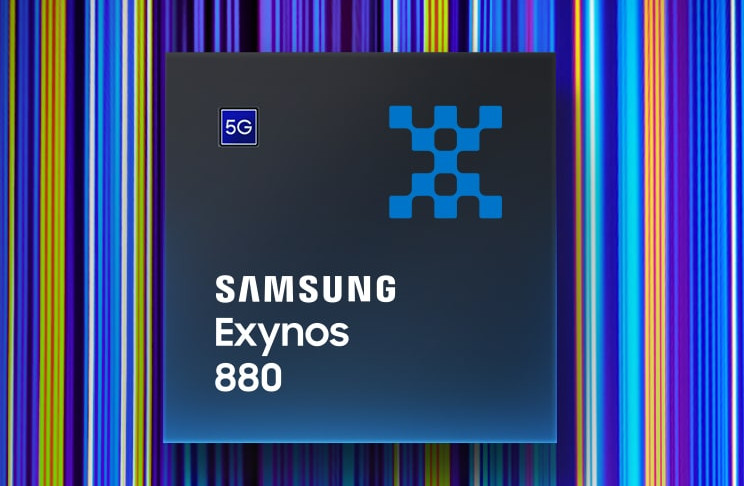
Samsung has announced Exynos 880, the company’s latest processor with built-in 5G modem and a cheaper version of the last year’s Exynos 980 soC for mid-range 5G smartphones. It is based on 8-nanometer (nm) FinFET process technology. It has two high performing ARM Cortex-A77 cores clocked at 2GHz and six efficient Cortex-A55 cores clocked at 1.8GHz and ARM Mali-G76 MP5 GPU. The modem also supports E-UTRA-NR Dual Connectivity (EN-DC), which combines 2CC LTE and 5G connectivity, to maximize mobile downlink speed up to 3.55Gbps. In addition, it is a multi-mode modem that utilizes major networks from 2G to 4G LTE for reliable mobility anywhere.
The Exynos 880 is able to handle complex image analysis and recognition tasks, supports triple-camera set-ups, while enabling a single-camera max resolution of 64Mp and a dual-camera rating of 20Mp for each camera. It supports 4K 30fps video recording and playback compared to 4K 120 fps in the Exynos 980.
The Exyos 880 already powers the Vivo Y70s smartphone in China and is expected in other mid-range 5G smartphones in the coming months. Check out the specifications and the comparison between the Exynos 880 and the 980 below.
| Samsung | Exynos 880 | Exynos 980 |
| Process | 8nm FinFET | |
| CPU | 2x Cortex-A77 @ 2GHz 6x Cortex-A55 @ 1.8GHz |
2x Cortex-A77 @ 2.2GHz 6x Cortex-A55 @ 1.8GHz |
| Memory | LPDDR4x, UFS 2.1, eMMC 5.1 | |
| Camera | Single-camera up to 64Mp, Dual-camera 20MP+20MP |
Single-camera up to 108Mp, Dual-camera 20MP+20MP |
| Display | Full HD+ (2520×1080) | WQHD+ (3360×1440) |
| Video Decode / Video Encode | 4K UHD 30fps encoding and decoding with HEVC(H.265), H.264, VP9 |
4K UHD 120fps encoding and decoding with HEVC(H.265), H.264, VP9 |
| Graphics | Mali-G76 MP5 | Mali-G76 MP5 |
| Modem | 5G NR Sub-6GHz 2.55Gbps (DL) / 1.28Gbps (UL), EN-DC 3.55Gbps (DL) / 1.38Gbps (UL), LTE Cat.16 5CA 1Gbps (DL) / Cat.18 2CA 200Mbps (UL) |
|
| Connectivity | Bluetooth 5.0, Wi-Fi 5 (802.11ac), FM Radio, GPS, GLONASS, BeiDou, Galileo | Bluetooth 5.0, Wi-Fi 6 (802.11ax), FM Radio, GPS, GLONASS, BeiDou, Galileo |
